You can now add Healthify as a preferred source on Google. Click here to see us when you search Google.
Pregnancy and alcohol
Key points about pregnancy and alcohol
- If you are pregnant or planning a pregnancy, not drinking is the safest option.
- Learn about the effects alcohol could have on your unborn baby and the risks associated with drinking during pregnancy.
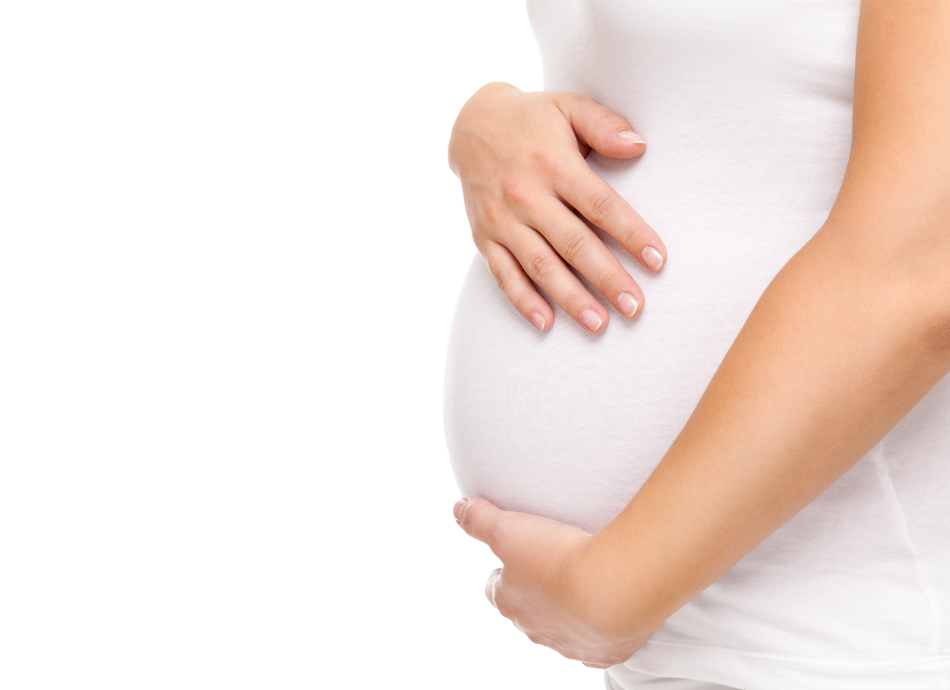
This message has been endorsed by many organisations, including Health NZ | Te Whatu Ora, the Health Promotion Agency, the New Zealand College of Midwives, the New Zealand Nurses Organisation, the Royal New Zealand College of General Practitioners, Sexual Wellbeing Aotearoa, and the Paediatric Society of New Zealand.
- Not drinking alcohol during pregnancy is the safest option.
- During pregnancy, alcohol can be transferred to your baby through the placenta and umbilical cord affecting your pēpi's development.
- This includes all types of alcoholic drinks including beer, wine, cider, spirits and ready-to-drinks (RTDs).
- This can happen at any stage of pregnancy, even before a woman knows she is pregnant.
- If you’re trying to get pregnant be alcohol-free.
- If you do drink alcohol and there is a chance you could become pregnant use effective contraception (birth control).
- Fetal Alcohol Spectrum Disorder (FASD) is a condition caused by the developing baby being exposed to alcohol. It has lifelong impacts on individuals, their whānau, carers and the wider community.
- Prenatal exposure to alcohol can also increase the risk of miscarriage, stillbirth and premature birth.
- It is never too late. Stopping your drinking will increase the chances that your baby will be born healthy.
Video: If you could be pregnant, stop drinking alcohol
This video may take a few moments to load.
(Counties Manukau Health, NZ, 2019)
Alcohol is a teratogen (a substance that may cause foetal abnormality) and can be transferred prenatally through the placenta and umbilical cord affecting the normal development of your baby. When you are pregnant, every time you drink alcohol, your baby is drinking alcohol too. Your baby can’t break down alcohol as well as you can and exposure to alcohol can seriously affect their development.
Prenatal (before birth) alcohol exposure can increase the risk of:
- miscarriage and stillbirth
- low birth weight and premature birth
- a range of life-long problems known as foetal alcohol spectrum disorder (FASD).
Fetal alcohol spectrum disorder (FASD) is a condition that can occur as a result of prenatal exposure to alcohol. Problems can include brain damage and physical birth defects. Problems may be seen after birth, or they may not be noticeable until the child is older, when they may have trouble learning or socialising or have behavioural problems. FASD can be difficult to diagnose because not all children live or experience FASD in the same way. FASD can create life long challenges, eg, learning, speech, attention span, language and aggression problems.
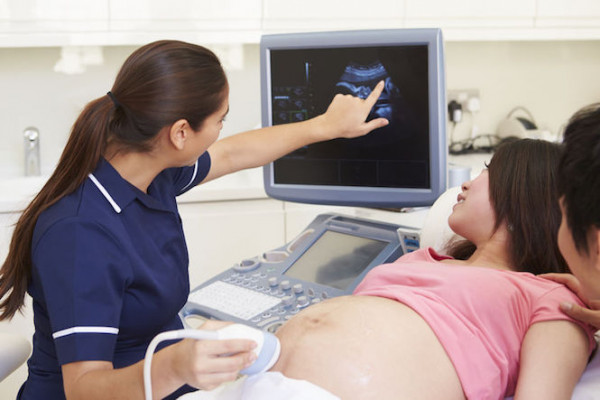
Image credit: 123rf
There is no known safe amount of alcohol, even small amounts of alcohol can harm a baby’s development. But it is not known at which point – if any – the risk completely disappears. Therefore, to avoid harming your baby/pēpi, it is best not to drink any alcohol at any stage during pregnancy. This includes the time around conception (getting pregnant).
The first thing to do is stop drinking alcohol. It is never too late. Stopping your drinking will increase the chances that your baby will be born healthy.
If you are concerned or are unable to stop, talk with your midwife or GP. It is not usually possible to know if your baby will be affected until after birth or in childhood.
For women who could be pregnant, are pregnant or planning a pregnancy, stop drinking alcohol. There is no known safe level of alcohol at any stage of pregnancy.
For non-pregnant women, health professionals advise:
- no more than 2 standard drinks daily
- no more than 10 standard drinks a week
- at least 2 alcohol-free days per week
- no more than 4 standard drinks on any single occasion.
Read more about low-risk drinking advice.(external link)
- If you are trying to get pregnant, stop drinking.
- Sometimes it can be hard to say ‘no’ to an alcoholic drink, and you might not want to share the news that you are pregnant – especially if it’s early in the pregnancy.
- If you are socialising or going to an event, ask a friend (who knows you're pregnant) to go with you. You can be alcohol-free together.
- Switch your alcoholic drinks for non-alcoholic alternatives, such as juice or lime and soda. There are plenty of zero-alcohol drinks available. Water and milk are good choices.
- When you're ready to share you're pregnancy news, let your whānau and friends know why you are not drinking and ask them to support you in this decision.
Apps reviewed by Healthify
You may find it useful to look at some Alcohol use apps.
If stopping drinking is difficult for you, or you are concerned about your drinking, there are organisations and people who can help you. Your midwife or GP can discuss ways you can stay healthy during pregnancy, answer your questions, or put you in touch with others who can help.
The Alcohol Drug Helpline(external link) is also here for you. Contact them on 0800 787 797 or free text 8681, 24 hours, 7 days a week.
Otherwise you can contact these organisations:
- Community Alcohol and Drug Services(external link) Free phone 0800 845 1818
- Support for family and friends(external link) Al-Anon
- 12 Step Plan(external link) Alcoholics Anonymous
- Alcohol & Drug addiction services, including the Bridge programme(external link)
Evidence and research from the NZ Health Promotion Agency (HPA)
HPA undertakes a range of research and evaluation activities to inform its alcohol and pregnancy work. Below is a list of evidence summaries, research reports about alcohol and pregnancy, and evaluations of services working to prevent and reduce harms caused by antenatal alcohol use.
Alcohol and Pregnancy – summary of evidence(external link) outlines why alcohol use is an issue during pregnancy, New Zealand statistics and approaches to reducing alcohol use in pregnancy.
Drinking alcohol during pregnancy(external link), a literature review undertaken by HPA in 2014, reviews recent New Zealand and international published research on alcohol and pregnancy.
Evaluation of the Hawke’s Bay DHB Developmental Assessment Programme FASD Assessment Pathway(external link) (Health and Safety Developments, 2015) – The Hawke’s Bay District Health Board (DHB) Developmental Assessment Programme (DAP) provides multi-disciplinary diagnostic assessments of children with complex developmental and behavioural concerns. One component of the DAP is a Fetal Alcohol Spectrum Disorder (FASD) Assessment Pathway for children with developmental and behavioural issues potentially related to prenatal alcohol exposure. This process evaluation of the DAP FASD Assessment Pathway was commissioned by HPA in 2015. It describes core components and delivery mechanisms of the FASD Assessment Pathway, identifies key implementation successes and challenges and outlines considerations for replication of an FASD Assessment Pathway in other regions.
Insights from women about drinking alcohol during pregnancy(external link), qualitative research undertaken by HPA in 2014, explores factors that influence alcohol drinking practices during pregnancy among different groups of New Zealand women.
Evaluation of the Waitematā DHB CADS Pregnancy and Parenting Service [PDF, 2.4 MB] (Health and Safety Developments, 2015) – Reducing harm for children affected by parental addiction and reducing unequal access to addiction services are key priorities for the HPA. Waitematā DHB Community Alcohol and Drug Service (CADS) Pregnancy and Parenting Service (PPS) provides an intensive assertive outreach case coordination service for parents of children aged under three-years-old and pregnant women who are experiencing problems with alcohol and other drugs. This process evaluation was commissioned by HPA to understand more about the PPS model, identify implementation successes and challenges and explore considerations for service replication in other regions.
Consumer awareness and understanding of alcohol pregnancy warning labels (external link) (Colmar Brunton, Social Research Agency, 2016) – This research was funded buy HPA and uses an online survey to find out about consumer awareness, recall and knowledge of current alcohol pregnancy warning labels. The research highlights the important role of alcohol warning labelling in raising awareness of the risks and harms of drinking alcohol while pregnant (or when planning a pregnancy).
Read more about alcohol and pregnancy from the HPA(external link)
Alcohol and pregnancy(external link) Health Promotion Agency, NZ
Alcohol – pregnancy and babies(external link) Health New Zealand | Te Whatu Ora
FASD(external link) Counties Manukau Health, NZ
Drinking alcohol while pregnant(external link) NHS Choices, UK
Resources
Alcohol and pregnancy – what you might not know(external link) HealthEd, NZ, 2021
Alcohol facts & effects factsheet(external link) Health Promotion Agency, NZ
Alcohol and pregnancy FAQs(external link) Health Promotion Agency, NZ
Apps
References
- Alcohol and pregnancy – a practical guide for health professionals(external link) Ministry of Health, NZ, 2010
- Australian guidelines to reduce health risks from drinking alcohol(external link) National Health and Medical Research Council, Australia, 2020
- Understanding FASD(external link) Fetal Alcohol Spectrum Disorder Care Action Network, NZ
Alcohol and pregnancy – a practical guide for health professionals
Health NZ | Te Whatu Ora advises that there is no known safe level of alcohol use at any stage of pregnancy. This includes the time around conception. The best advice is for a woman to stop drinking alcohol if she could be pregnant, is pregnant or is trying to get pregnant. This advice is supported by the Health Promotion Agency.
Advising women not to drink alcohol when pregnant or planning to be pregnant, explaining the consequences and supporting drinkers to stop when pregnant are simple prevention tasks that can have a big impact. Health professionals have a key role in providing this advice (often called brief interventions) as well as the ideal opportunity to do so.
The following three-step process (Alcohol ABC(external link)) can be used as an intervention guide when working with women who are planning a pregnancy or who are pregnant.
- Ask about alcohol use, and record and assess the level of alcohol consumption.
- Provide brief advice that there are no known safe levels of alcohol use during pregnancy.
- Offer counselling or a referral to alcohol support services.
Resources
ABC Alcohol for Pregnancy(external link) provides a practical, three-step guide to help primary care health professionals address alcohol use in pregnancy in their conversations with women.
Alcohol and pregnancy consensus statement(external link) New Zealand College of Midwives, 2018.
Changes in alcohol consumption during pregnancy(external link) Growing up in New Zealand study (GUiNZ), 2015
Alcohol, Pregnancy and FASD – learning programme for midwives and LMCs(external link) Learn Online
HPA resources (alcohol.org.nz)
- Resources for health professionals(external link)
- Health promotion resources(external link)
- Professional development opportunities(external link)
- The early pregnancy assessment tool(external link)
- Don't know? Don't drink campaign digital toolkit(external link)
- Alcohol and pregnancy – what you might not know(external link)
Apps
Brochures
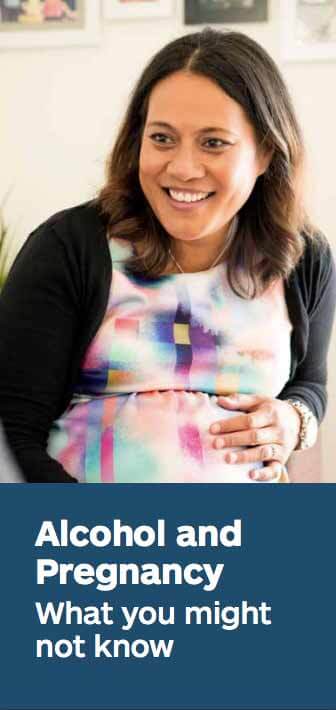
HealthEd, NZ, 2021
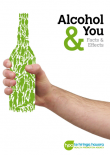
Health Promotion Agency, NZ
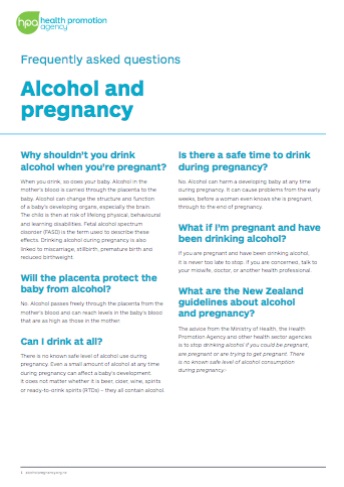
Health Promotion Agency, NZ
Credits: Healthify Editorial Team. Healthify is brought to you by Health Navigator Charitable Trust.
Reviewed by: Luisa Silailai, Programme Manager for Alcohol Harm Minimisation and accredited DAPAANZ Clinical Supervisor/Alcohol and other Drugs and Problem Gambling Clinician.
Last reviewed:
Page last updated:





